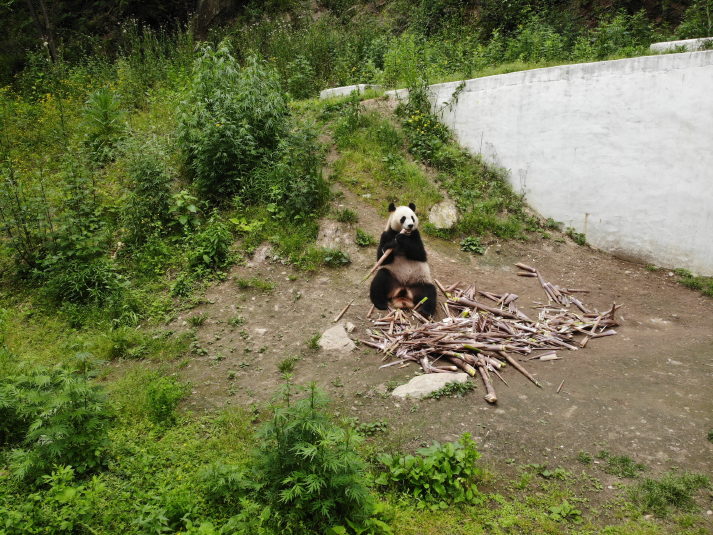|
||||||||||
| Home Nation World Business Opinion Lifestyle ChinAfrica Multimedia Columnists Documents Special Reports |
|
||||||||||
| Home Nation World Business Opinion Lifestyle ChinAfrica Multimedia Columnists Documents Special Reports |
| ChinAfrica |
| Almost perished, pandas now enjoy a happy life as protection rises to the next level |
| Around 345 giant pandas live in the wild in the Qinling Mountains, making it the area with the highest panda population density in China. |
| By Li Qing VOL. 13 OCTOBER 2021 ·2021-09-28 |

The world's only captive brown giant panda, Qi Zai, made its public debut in late May, during the trial operation of a science park in Xi'an, Shaanxi Province. Twelve years ago, it was found as a weak and neglected cub in a national nature reserve in Foping County, Hanzhong City of the province.
The county, located at the southern foot of the Qinling Mountains, makes for a first-rate habitat for giant pandas because of its temperate and climate. Forest coverage exceeds 90 percent, with ubiquitous lush vegetation and rich flora and fauna species.
The world's first brown panda was discovered in 1985 in the Qinling Mountains, and ever since that moment, all photographs of wild brown pandas on record were taken in that very area. Experts think that the different color could be the result of a genetic mutation or atavism.
Valley deep, mountain high
Pu Zhiyong, a panda caregiver at the Foping Panda Valley, said that Qi Zai has been roaming the valley for three years now, and is known for being gentle, funny and adorable.
The Qinling giant panda was recognized as a subspecies of the giant panda in 2005. It has a smaller and rounder skull, a shorter snout and less fur than the more familiar Sichuan subspecies, he said.
In 2009, the government established the Qinling Wild Panda Training Base in the reserve to feed panda cubs and provide them with essential survival training so that more giant pandas can be released into the wild.
On May 20, a giant panda was released into the wild at the Foping National Nature Reserve while wearing a satellite-enabled positioning collar to monitor its condition.
According to government data, there are more than 130 pandas living in the reserve, and their population is steadily increasing. Around 345 giant pandas live in the wild in the Qinling Mountains, making it the area with the highest panda population density in China.
The wild panda population in China had increased to 1,864, up 16.8 percent from a decade ago, while those in the Qinling Mountains went up by 26.4 percent, the highest growth rate in the country, according to the latest panda population census, whose results were released in 2015.
The panda population growth should be attributed to the contributions of staff members like Pu as well as the wildlife conservation efforts of both the government and the general public.

Panda cameos
Over the past decade, Shaanxi Province has made unprecedented efforts to protect the giant pandas that inhabit the Qinling Mountains and the number of panda reserves increased by 11, occupying a total area of 1,692 square km. Foping now even boasts two national nature reserves. Pandas aside, the superior natural settings also benefit other endangered species, including the snub-nosed monkey.
Moreover, hi-tech gadgets and more intense training have further heightened the levels of local panda protection.
Pandas would be extinct if the people had not taken measures to protect them. They are not seen anywhere else in the world, therefore China needs to protect them, and China is doing a good job, said Beena Sarada, an Indian visitor.
Pu has worked there for 12 years. Having grown up in the county, he sees himself as bound by destiny to the animal. In 2009, he participated in a rescue, but the panda unfortunately passed away despite treatment. The preciousness of giant pandas made him determined to devote himself to their protection.
"We have to stay in the mountains and endure the monotony of life. But the fun of taking care of pandas keeps me going. You must love it from the bottom of your heart. Otherwise, it won't last," he said.
Pu also ascribes the positive results of panda conservation to people's enhancing awareness of animal protection. This newfound mindfulness generates lovely scenery in the reserve - pandas freely making their way along the winding mountain roads neither being afraid of people nor wanting to hurt them.
People are excited to see the pandas, he said, adding that some visitors will bring food and gaze at them all day. Pu has also shared pandas' playful moments online. That way, people, especially those who live far away, can gain an understanding of these giant black and white cuties.
They may, for example, find out that pandas also eat pumpkins. The audience very much enjoys our panda videos, he concluded.
(Printed Edition Title: Paradise for Giant Pandas)
Comments to zanjifang@chinafrica.cn
| About Us | Contact Us | Advertise with Us | Subscribe |
| Copyright Beijing Review All rights reserved 京ICP备08005356号-5 京公网安备110102005860号 |